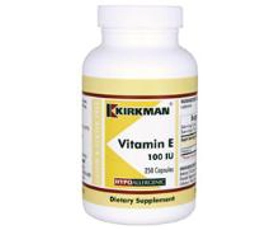vitamin E 100 IU 250 颗
kkm-0030-250
Description
Kirkman's Vitamin E 100 IU hypoallergenic capsules are produced from synthetically manufactured dl-alpha tocopheryl acetate. There are no animal derived ingredients present, and the vitamin E is soy-free. This is a hypoallergenic formulation, specially designed for individuals with special requirements and sensitivities.
Kirkman's Super Nu-Thera® products also contain vitamin E. Some of the specialty versions of these products, such as the liquid or hypoallergenic items, have reduced vitamin E levels due to the formulation requirements. Additional supplementation may be indicated for individuals using these products and not getting the balance of their vitamin E requirements from their diet.
Vitamin E's role in good health
Vitamin E is an essential antioxidant nutrient that is receiving considerable public attention. Interest in the nutrient is high because new scientific data suggests that optimal intake of vitamin E can aid in the neutralization of free radicals.
Free radicals originate in bodily processes and also result from environmental exposures. They are held in check by antioxidants. It is important to maintain a healthy balance of antioxidants and free radicals. When free radicals abound because of diet, lifestyle, environment or other negative influences, antioxidant availability is overwhelmed and free radical damage may occur.
Antioxidant nutrients play a significant role in the body's defense against excess levels of free radicals. These nutrients include vitamins C, E, beta-carotene and several minerals, such as selenium. These antioxidants all work together.
Vitamin E is also important in supporting immune response and may play a beneficial role in allergic response.
How does vitamin E function as an antioxidant?
Vitamin E, which is fat soluble, is present in lipids, most significantly in the lipids of cell membranes and in circulating low density lipoproteins. As free radicals are produced as byproducts of metabolic processes or originate from environmental pollutants, available vitamin E neutralizes them. If unchecked by an antioxidant, the free radicals attack cell constituents, which can result in:
• Cell death or alteration of the cell's respons
• Inactivation of enzymes or other proteins
What are symptoms of vitamin E deficiency?
Protection against damage to cells of course is important. Symptoms of vitamin E deficiency in humans can include nerve damage, muscle weakness, poor coordination, breaking of red blood cells and involuntary eye movement.
Free Of
Casein, gluten, soy, wheat, artificial colorings, artificial flavorings, gelatin, fish, peanuts, tree nuts or yeast.
These statements have not been evaluated by the Food & Drug Administration. This product is not intended to diagnose, treat, cure or prevent any disease.
No Reviews Posted Yet - be the first!(write review)





